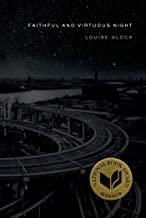Faithful and Virtuous Night by Louise Gluck 2014
Gluck is perhaps America’s greatest contemporary poet. She was the Poet Laureate of the U.S. and the winner of the Nobel Prize for Literature in 2020, the National Book Award, the Los Angeles Book Prize for her Collected Poems 1962-2012, the Pulitzer Prize for the 1992 Wild Iris, the Bollingen Prize for Vita Nova in 1999, and the National Humanities Medal from President Obama. ‘Faithful and Virtuous Night’ is her 12th volume of poetry.
Her biography on the Poetry Foundation web site refers to her work as ‘exploring the agony of the self’, and I can’t really do better than that. These poems, written in straightforward and accessible language, deal with loss, memory, time, and identity. The reader travels back with Gluck who writes these poems as a boy/man who has lost his parents to an auto accident early in life and whose life is then shadowed by this loss. The writer is a painter as well as a poet who struggles with expressing feelings in both words and paint. Memory is a focus, described beautifully as “points of clarity in a mist, intermittently visible,/like a lighthouse whose one task/is to emit a signal.” and “Silence had entered me./It was like the night, and my memories—they were like stars/in that they were fixed, though of course/if one could see as do the astronomers/one would see they are unending fires, like the fires of hell.”
I was led to this book by two quotes in the Geoff Dyer book I read and reviewed earlier this month. Dyer’s book on endings used two brief portions of Gluck’s eponymous poem as epigraphs for sections as follows: “If it is so difficult to begin, imagine what it will be to end—“ and “I think here I will leave you. It has come to seem/there is no perfect ending./Indeed, there are infinite endings./Or perhaps, once one begins,/there are only endings.” In many ways, these two lines are the perfect summary of Gluck’s book and her oeuvre—life passes quickly in random and unplanned ways and all we can do is to mark its passing with close reading of the world and tightly, though briefly, holding on to those whom we love. A bit bleak, but then again, it’s poetry.



